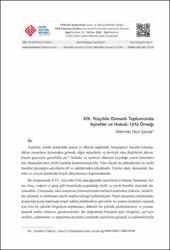| dc.contributor.author | Şanda, Mehmet Nuri | |
| dc.date.accessioned | 2022-12-29T08:24:42Z | |
| dc.date.available | 2022-12-29T08:24:42Z | |
| dc.date.issued | 2022 | en_US |
| dc.identifier.citation | ŞANDA, Mehmet Nuri. "XIX. Yüzyılda Osmanlı Toplumunda Aşiretler ve Hukuk: Urfa Örneği." FSM İlmî Araştırmalar İnsan ve Toplum Bilimleri Dergisi, 20 (2022): 239-262. | en_US |
| dc.identifier.uri | https://dergipark.org.tr/tr/pub/fsmia/issue/74336/1225612 | |
| dc.identifier.uri | https://hdl.handle.net/11352/4221 | |
| dc.description.abstract | Aşiretler, kendi aralarında asayiş ve düzeni sağlamak, konargöçer hayatta karşılaştıkları
sorunların üstesinden gelmek, diğer aşiretlerle ve devletle olan ilişkilerini düzenlemek
gayesiyle genellikle şer’i hukuka ve merkezi idarenin koyduğu yazılı kanunlara
ters düşmeden bazı sözlü kurallar benimsemişlerdir. Töre olarak da adlandırılan bu sözlü
kurallar kaynağını aşiretlerin örf ve adetlerinden almaktadır. Töreler idari, ekonomik, hukuki
ve sosyal alanlarda birçok düzenlemeyi kapsamaktadır.
Bu araştırmada X IX. yüzyılda Urfa sancağındaki aşiretlerin evlenme, boşanma, miras,
borç, yağma ve gasp gibi konularda uyguladığı sözlü ve yazılı kurallar üzerinde durulacaktır.
Çalışmada, nitel araştırma yöntemlerinden tarihsel araştırma yöntemi, örnekleme
yöntemi ve doküman-içerik analizi tekniği kullanılmıştır. Nitel araştırma yönteminde,
araştırılan konu hakkında tespit edilen problemlere güvenilir ve somut çözümler sunmak
için titiz bir şekilde belgelerin toplanması, dikkatli bir şekilde çözümlenmesi ve yorumlanarak
analiz edilmesi gerekmektedir. Bu doğrultuda Osmanlı arşiv belgeleri, şerefiye
sicilleri, salnâmeler ve araştırma-inceleme eserlerde aşiretlerin gelenek ve görenekleriyle ilgili bölümler tespit edilmiş, bu bölümler dikkatli bir şekilde çözümlendikten sonra analiz
edilerek bilim dünyasının hizmetine sunulmuştur.
Literatürde Urfa’daki aşiretler hakkında bazı tez ve araştırmaların yapılmış olduğu
görülse de bu araştırmalarda önemli bazı arşiv belgelerinin kullanılmadığı tespit edilmiştir.
Bu arşiv belgelerinin alana katkı sağlayacağı düşünülmektedir. | en_US |
| dc.description.abstract | In order to maintain safe and security among themselves, overcome the problems
they face in nomadic life, and regulate their relations with other tribes and the state, the
tribes have generally adopted some oral rules without contradicting the shar’i law and the
written laws established by the central administration. These oral rules, also called “moral
laws”, derive their source from the customs and traditions of the tribes. Moral laws include
many regulations in administrative, economic, legal and social fields.
In this study, issues such as marriage, divorce, inheritance, debt, looting and highjack
will be emphasised on the oral and written rules applied by the tribes in Urfa sanjak in
the 19th century. In the research, the historical research method, sampling method and
document-content analysis technique from qualitative research methods have been used.
In the qualitative research method, it is necessary to elaborately collect documents, carefully
analyse and interpret to provide for reliable and concrete solutions to the problems
identified about the researched subject. Accordingly, the sections related to the customs
and traditions of the tribes in Ottoman archive documents, court records, annuals and
research-study works have been looked over, and these sections have been analysed carefully
to present to the service of the science world.
Although, in the literature some theses and studies have been conducted on the tribes
in Urfa, it has been detected that some important archival documents have not been used
in those studies. These archieve documents have been believed to contribute to the field. | en_US |
| dc.language.iso | tur | en_US |
| dc.publisher | FSM Vakıf Üniversitesi | en_US |
| dc.relation.isversionof | 10.16947/fsmia.1225612 | en_US |
| dc.rights | info:eu-repo/semantics/openAccess | en_US |
| dc.subject | Osmanlı | en_US |
| dc.subject | Toplum | en_US |
| dc.subject | Urfa | en_US |
| dc.subject | Aşiret | en_US |
| dc.subject | Örf ve Adetler | en_US |
| dc.subject | Ottoman | en_US |
| dc.subject | Society | en_US |
| dc.subject | Tribe | en_US |
| dc.subject | Customs and Traditions | en_US |
| dc.title | XIX. Yüzyılda Osmanlı Toplumunda Aşiretler ve Hukuk: Urfa Örneği | en_US |
| dc.title.alternative | The Tribes and Law in Ottoman Society in 19th Century: The Case of Urfa | en_US |
| dc.type | article | en_US |
| dc.relation.journal | FSM İlmî Araştırmalar İnsan ve Toplum Bilimleri Dergisi | en_US |
| dc.contributor.department | FSM Vakıf Üniversitesi, Rektörlük, FSM İlmî Araştırmalar İnsan ve Toplum Bilimleri Dergisi | en_US |
| dc.contributor.authorID | https://orcid.org/0000-0003-3800-6996 | en_US |
| dc.identifier.issue | 20 | en_US |
| dc.identifier.startpage | 239 | en_US |
| dc.identifier.endpage | 262 | en_US |
| dc.relation.publicationcategory | Makale - Ulusal Hakemli Dergi - Başka Kurum Yazarı | en_US |



















